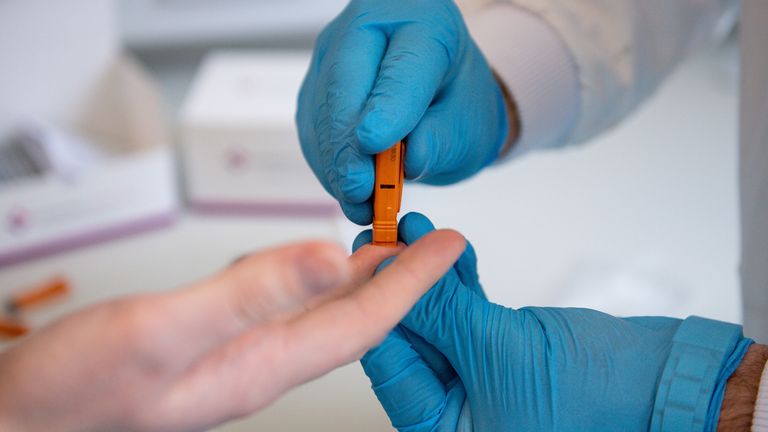With help from artificial intelligence, researchers have identified a biological signature of Parkinson’s disease they hope could lead to a simple blood test for the condition at least seven years before symptoms appear.
A predictive test for Parkinson’s could be game changing.
The progressive condition affects more than 150,000 people in the UK and is currently the world’s fastest-growing neurodegenerative disorder.
Parkinson’s is a broad spectrum of conditions, but the most common symptoms are slowness of movement, tremors, and muscle stiffness.
There are currently no drugs that slow or stop Parkinson’s, and efforts to develop preventative treatments are hampered by the ability to know whether someone is going to develop the condition.
Like many progressive neurological conditions, by the time symptoms emerge, the damage to brain cells caused by Parkinson’s has already occurred.
“At present, we are shutting the stable door after the horse has bolted, and we need to start experimental treatments before patients develop symptoms,” said Professor Kevin Mills at UCL Great Ormond Street Institute of Child Health, who helped develop the blood test.
Using machine learning – a form of artificial intelligence – researchers from University College London and University Medical Centre in Goettingen, Sweden, screened blood samples from people with Parkinson’s and detected eight key proteins or “biomarkers” common to those with the condition.
They then used their machine learning tool to analyse blood samples taken a decade ago from people with a sleep condition called Rapid Eye Movement Disorder, around 75% of whom go on to develop Parkinson’s.
The AI has so far been able to correctly predict which patients went on to develop Parkinson’s and did so up to seven years before symptoms first appeared.
“By determining eight proteins in the blood, we can identify potential Parkinson’s patients several years in advance,” said Dr Michale Bartl at UMC Goettingen.
“This means that drug therapies could potentially be given at an earlier stage, which could possibly slow down disease progression or even prevent it from occurring.”
The researchers have more work to do to validate the tests’ accuracy and develop a version that could be easily used in a clinic.
“If replicated in larger studies, these tests or panels may prove to be invaluable in supporting the diagnosis of Parkinson’s,” said neurologist Professor Ray Chaudhuri, at King’s College in London.
In the short term, a test could be used to replace the invasive lumbar puncture technique currently required to confirm Parkinson’s.
A blood test that predicts Parkinson’s years in advance may be key to accelerating clinical trials – but it’s not without ethical hurdles, says Professor Chaudhuri.
Currently, doctors have no drugs to prevent or stop Parkinson’s – so is it right to offer people a test?
Gary Shaughnessy was diagnosed with Parkinson’s nine years ago and recognises the dilemma.
He said: “I hate having Parkinson’s so why would I want to know having it for one second more than is absolutely necessary?”
However, he argues there are actions people can take to mitigate the symptoms of Parkinson’s.
His is exercise – he’s a competitive marathon runner.
But he also recognises, having a predictive test for Parkinson’s could be a key step towards developing new treatments.
“If we can make progress on a cure or treatments, it may be too late from my perspective, but it we could do something for other people that would be brilliant,” he said.



























